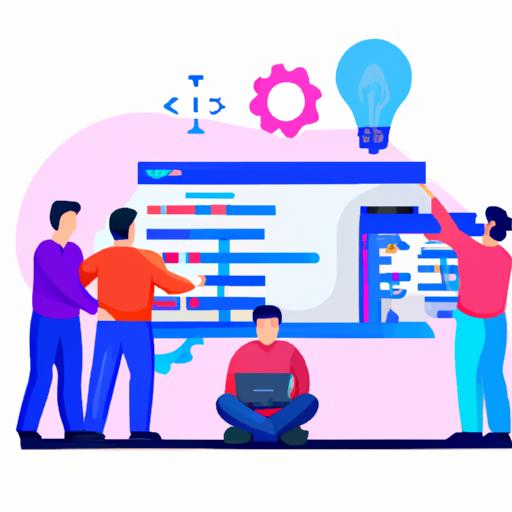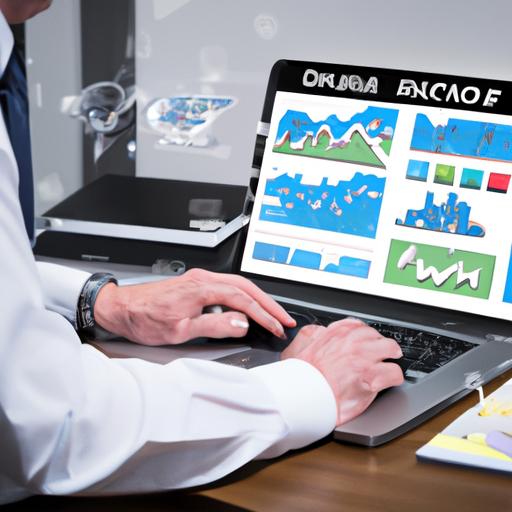Benefits of Using Data Management System Software

Our skilled team of developers are hard at work creating the best data management system software.
Data management system software is an essential tool for organizations of all sizes. It offers numerous benefits that can help streamline business operations, improve data analysis, and increase productivity. Here are some of the key benefits of using data management system software:
Streamlined Data Collection and Storage
Data management system software provides a centralized platform for collecting, storing, and managing data. This allows organizations to consolidate their data sources and reduce the risk of data duplication. With a data management system in place, data can be easily accessed and shared across teams, making collaboration more efficient.
Enhanced Data Security and Privacy
Data management system software provides robust security features that protect sensitive data from unauthorized access and cyber threats. It enables organizations to manage data access permissions and monitor user activity in real-time. Additionally, it helps organizations comply with data privacy regulations such as GDPR and CCPA.
Improved Data Analysis and Decision-Making
Data management system software offers powerful data analysis tools that help organizations derive actionable insights from their data. With advanced analytics capabilities such as data visualization and predictive analytics, organizations can make data-driven decisions that improve business outcomes.
Increased Collaboration and Productivity
Data management system software facilitates collaboration among teams, enabling them to work together on projects and share data seamlessly. This leads to increased productivity and faster time-to-market for products and services. Additionally, a data management system reduces the amount of time spent on manual data entry and allows employees to focus on higher-value tasks.
Types of Data Management System Software

Effortlessly manage your data with our powerful data management system software.
When it comes to data management system software, there are various types available in the market. Each one has its own unique features and benefits. Let’s explore some of the most popular types of data management system software:
Relational Database Management Systems (RDBMS)
RDBMS is a type of data management system software that uses a relational model for storing and managing data. It is based on a table format, where each table represents a data entity, and the relationships between these entities are defined by the user. RDBMS is widely used in industries such as finance, healthcare, and retail due to its ability to handle complex data structures.
NoSQL Databases
NoSQL databases are non-relational databases that don’t rely on a fixed schema. They are designed to handle large amounts of unstructured and semi-structured data, making them ideal for big data analytics and real-time applications. NoSQL databases are widely used in industries such as social media, e-commerce, and gaming.
Object-Oriented Databases
Object-oriented databases store data in the form of objects, rather than tables. They are designed to handle complex data structures and provide better performance than traditional RDBMS. Object-oriented databases are widely used in industries such as engineering, scientific research, and telecommunications.
Cloud-Based Databases
Cloud-based databases are databases that are hosted in the cloud, rather than on-premises. They offer scalability, flexibility, and cost-effectiveness, making them ideal for small and medium-sized businesses. Cloud-based databases are widely used in industries such as marketing, finance, and human resources.
Choosing the right type of data management system software depends on the specific needs of your organization. It’s important to evaluate the features and benefits of each type carefully before making a decision.
Features to Look for in Data Management System Software

Our cutting-edge data management system software powers the servers that keep your business running smoothly.
When it comes to choosing the right data management system software, it’s essential to evaluate the features and functionality of each option. Here are some vital features to consider when selecting a data management system software:
Data Backup and Recovery
Data backup and recovery features are crucial for ensuring that your organization’s data is safe and secure. Look for software that offers automatic backup and recovery capabilities and has a reliable disaster recovery plan in place.
Data Visualization and Reporting
Data visualization and reporting features are essential for interpreting and analyzing large data sets. Choose software that offers customizable dashboards and reports with real-time data updates and visualization options.
Data Integration and Migration
Data integration and migration features are necessary for managing and transferring data between different systems. Look for software that offers seamless integration with other data sources and has easy-to-use migration tools.
Data Governance and Compliance
Data governance and compliance features are essential for ensuring that your organization’s data complies with industry regulations and internal policies. Choose software that offers access controls, data privacy, and security features to ensure that your data is protected from unauthorized access and misuse.
By considering these essential features, you can choose the right data management system software that meets your organization’s needs and goals.
Choosing the Right Data Management System Software
In today’s data-driven world, choosing the right data management system software is crucial for the success of any organization. With numerous options available in the market, it can be overwhelming to decide which one is the best fit for your business needs. In this section, we will discuss some essential factors to consider when choosing the right data management system software.
Assessing Organizational Needs and Goals
The first step in choosing the right data management system software is to assess your organization’s needs and goals. Before making any decisions, you need to understand what your business requirements are and what you aim to achieve with the system. Consider factors such as the size of your organization, the number of users who will be using the system, the amount of data you need to manage, and the complexity of your data.
Evaluating Features and Functionality
Once you have assessed your organizational needs and goals, the next step is to evaluate the features and functionality of the data management system software. Look for features that are essential for your business, such as data backup and recovery, data visualization and reporting, data integration and migration, and data governance and compliance. Ensure that the system can handle your current and future data management requirements.
Comparing Costs and ROI
When choosing the right data management system software, you should also consider the costs involved and the potential return on investment (ROI). Compare the pricing of different vendors and their licensing models. Look for a system that provides value for money and has a positive ROConsider factors such as the cost of implementation, training, maintenance, and upgrades.
Considering Vendor Reputation and Support
Finally, when choosing the right data management system software, you should also consider the vendor’s reputation and support. Look for a vendor with a good track record, positive customer reviews, and excellent customer support. Ensure that the vendor provides comprehensive documentation, training, and ongoing support to help you get the most out of the system.
In conclusion, choosing the right data management system software is critical for the success of any organization. By assessing your organizational needs and goals, evaluating the features and functionality, comparing costs and ROI, and considering vendor reputation and support, you can make an informed decision and choose the best system for your business.
Conclusion
In conclusion, data management system software is an essential tool for any organization that deals with data. It helps to streamline data collection and storage, enhance data security and privacy, improve data analysis and decision-making, and increase collaboration and productivity.
When choosing the right data management system software, it is crucial to assess the organizational needs and goals, evaluate features and functionality, compare costs and ROI, and consider vendor reputation and support.
Implementing and maintaining the software requires careful planning and preparation, training and onboarding users, monitoring and maintaining system performance, and upgrading and scaling the system as needed.
Overall, data management system software is a valuable investment that can help organizations make better use of their data and gain a competitive advantage in their respective industries.